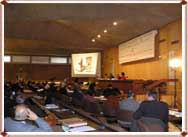6 May 2004 : Opening address of the International Symposium “Cultural Diversity and Globalization, the Arab-Japanese Experience, a Cross-Regional Dialogue” by His Excellency Mr Teiichi Sato, Ambassador extraordinary and Plenipotentiary, Permanent Delegate of Japan to UNESCO
(Mr Teiichi Sato has been Permanent Delegate of Japan to UNESCO until September 2006)
©Delegation of Japan to UNESCO
"Mr Director General,
Mr Bin-Hassan, Ambassador of Oman,
Mr Al-Nafisi, Ambassador of Kuwait,
Mrs Toyama, former Minister of Education, Culture, Sports, Science and Technology of Japan,
Excellencies,
Distinguished participants,
Ladies and Gentlemen,
It is a great pleasure for me to take part in this dialogue together with renowned speakers from Japan , the Arab world, Europe , and fellow colleagues at UNESCO. This is indeed a very welcomed opportunity for a cross-cultural and interdisciplinary examination of topics, which have now become very dear to our hearts: cultural diversity and globalization. We owe this event in particular to the steadfast encouragement from past and present Chairpersons of the Arab Group at UNESCO, and to the expertise of Mrs Katerina Stenou and her staff from the Division of Cultural Policies and Intercultural Dialogue. I wish to express my sincere gratitude to them and to all the others who have worked to put this event together
I wish to take just a few moments to share with you some thoughts on how we might usefully approach this subject, keeping in mind our agenda, and putting things in perspective.
It seems to me that what is central to our understanding of cultural diversity, is the realization that has been and will continue to be preserved through a dynamic process. A static view of the situation surrounding us may tend to lead to a particular prescription for cultural diversity, which is that it should be protected. I submit that the dynamic view leads us to a better response, which is to promote rather than protect cultural diversity, and that the strongest driving force behind its promotion is the interaction of cultures. Cultures interact, they give and take, they merge and they develop. It is through this dynamic process, which is part and parcel of what we know as "globalization", that new sources of diversity emerge.
History is the best testimony to this. In our first session we will compare the processes of modernization in Japan and the Arab world. In those processes it is clear that we have both preserved our unique cultures, while at the same time, through exchange and integration with the rest of the world, our cultures have also evolved into something new. In fact, this can also be said of Europe , and of any other region for that matter
When we talk of cultures, we often have in mind what is indigenous to our nations. However, cultures can also be shared by several regions, over a continent, or even globally; they may more appropriately be called "civilizations" when they become widespread enough.The main question then for us to explore in the second session is whether globalization favours more the individual cultures or whether it tends towards the integrative force of civilizations. The hypothesis that I would like to put forth is that it must be both, and they are in fact two sides of the same coin.
Another important question to ponder is whether culture is something that is best left to the realm of the individual or the community, or whether there is a place for the state or the international community to get involved. Clearly, culture has been a matter for state policy in many countries, and there are already a number of international conventions in this field. We are now being asked how we want to deal with cultural diversity.
In this symposium, and in particular the last session, we will build on the basis of regional studies and historical analysis, to explore innovative approaches to intercultural dialogue. I look forward to an enlightening and creative outcome from the discussion of this .symposium, which will be particularly helpful for UNESCO, to advance its agenda for cultural diversity.
Thank you.
Links
On 6 May 2004, Mr Seiichi Kondo, Former Under Secretary-General of OECD, Director-General of the Cultural Affairs Department , Ministry of Foreign Affairs of Japan, now Permanent Delegate of Japan to UNESCO (until September 2006) closed the above symposium with a speech.
(Back to English Speech Page - Back to English Archive Page)
Legal Matters | About Accessibility | Privacy Policy
Copyright : 2013 Permanent Delegation of Japan to UNESCO
